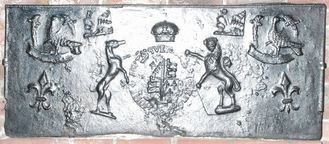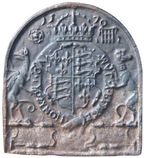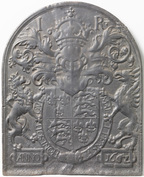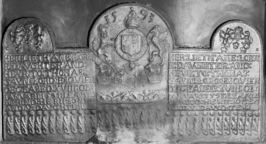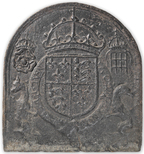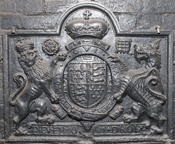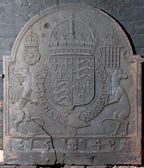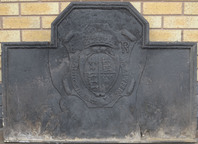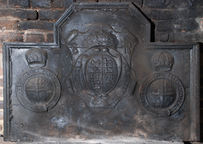-
10
Description: Rectangular; rope edging (top and sides); central Tudor royal shield with encircling garter (motto reversed: HONE SOVT QVEY … PEN), separate greyhound and lion supporters, separate crown; a bird, repeated in each top corner, its wings displayed and inverted and its head facing behind and to the left, standing on a scroll; a fleur de lys repeated in the bottom corners; inside the birds is a repeated stamp, half of one similar to a stamp on a fireback in Hastings Museum.
Notes: The particular form of the Tudor arms and supporters is encountered on other firebacks, as are the distinctive style of fleurs de lys and the birds (probably swans, a Lancastrian icon). The plain scroll upon which the bird is perched suggests that there might have been a painted inscription on it originally and that the stamp had not been made specifically for the decoration of firebacks but was, perhaps, redundant from interior domestic decoration. Formerly at Framfield, East Sussex.
Arms: Tudor royal (prob. Elizabeth I)
- Decoration tags:
- rectangular (shape)
- rope (edging)
- carved stamps
- heraldic
- armorial
- royal
- objects
Manufactured: in the mid- to late-16th century possibly at Pounsley Furnace, Framfield in the Weald area of England.
Current location: The Clergy House, Alfriston, East Sussex, England.
Museum number: 200044 (part of the National Trust museum group)
-
1135
Description: Arched shape; fillet edging; top centre, date; decorative Tudor royal shield, crown, garter (motto clockwise but reversed) and supporters (dragon and greyhound); a rose to the left and a portcullis (grid of 6) to the right side of crown; the supporters stand on a horizontal compartment which, on similar firebacks, often contains the date.
Notes: There are several firebacks with the Tudor royal arms that were probably originally produced in the Spanish Netherlands, perhaps illustrating the association between England and Spain through the marriage of Henry VIII and Katherine of Aragon. The firebacks differ in several small details, such as the form and rotation of the Garter motto, the style of the crown, the positioning of the supporters in relation to the Garter, and the form and size of the rose and portcullis.
Inscription: 15 70 / HONY SOYT QVI MAL Y PENSE
Arms: English royal Tudor
- Decoration tags:
- rounded arched (shape)
- fillet (edging)
- whole carved pattern
- individual numbers
- heraldic
- armorial
- text
Manufactured: in 1570 possibly in the Wallonia area of Luxemburg.
Current location: not known.
- Attached to series:
- Tudor royal armorial firebacks
- Continental Tudor royal armorial firebacks
-
1231
Description: Arched rectangular shape; ovolo-moulded edging; shield, Garter, crowned helm and mantling of the English royal arms to 1603 with crowned lion and griffon supporters standing on separate rectangular cartouches containing the word 'ANNO' and the date '1662'; above the mantling are the initials 'I R'
Notes: The date appears to have been altered from 1602. The initials 'I R' for Jacobus Rex (James I of England) are inappropriate for the date in both its original and its altered form; also the griffon supporter on the sinister side is incorrect, a dragon being correct for the arms of Elizabeth I in 1602. There is a vertical plankline left of centre.
Inscription: I R / HONI SOIT QVI MAL I PENSE / ANNO 1662
Arms: English Tudor royal
- Decoration tags:
- rounded arched (shape)
- ovolo (edging)
- whole carved pattern
- individual letters
- planklines
- heraldic
- armorial
- royal
- text
Manufactured: in 1662 possibly in the Ardennes area of Belgium.
Current location: Rijksmuseum, Museumstraat, Amsterdam South, North Holland, Netherlands.
Museum number: BK-NM-10837 (part of the Rijksmuseum museum group)
-
200
Description: Composite; rectangular with semi-circular arches in middle (large) and ends (small) of top edge; rope on all edges except bottom; central panel effectively comprises an arched fireback form with Tudor royal arms (temp. Elizabeth I) with date above, and, below, letters G M, made from rope with fleur de lys terminals between two coronets surmounted by lions; below this are fronds with roses. On either side of this panel are placed the Anne Forster inscription panels; above each of these is a rose and crown with lion and dragon supporters, beneath which are three fleurs de lys. Along the base of the inscription panels and the central panel are single rows of ‘grape bunch’ shapes, beneath which are repeated trailing vine decoration from impressed wooden strips across the entire width of the fireback; 35 in all.
Notes: Formerly at Baynard's Park, Ewhurst, Surrey; GM probably refers to Sir George More, who built Baynards Park after buying the estate in 1587, and who moved to Loseley in 1604. The central coat of arms has been noted on two other firebacks, dated 1588 (no. 41) and 1595 (no. 482). The rose and crown stamps have been noted on a fireback in Haslemere Museum, and on examples illustrated by Lower (all of which bear the date 1582 and the initials IA; e.g. no. 107 or no. 472). The association of these stamps and the particular form of rope lettering, with the Anne Forster inscription and the ‘grape bunch’ shapes, both of which have been linked with other stamps from Pounsley furnace, suggests that they, too, were part of the stock of those works.
Inscription: 15 93 / GM / HER : LIETH : ANE : FORST/ R : DAVGHTER : AND : / HEYR : TO : THOMAS : / GAYNSFORD : ESQVIER / DECEASED : XVIII : OF: / IANVARI : 1591 : LEAVYNG / BEHIND : HER II : SONES : / AND : V : DAVGHTERS [twice]
Arms: Tudor royal
- Decoration tags:
- rectangular with three arches (shape)
- rope (edging)
- simple stamps
- carved stamps
- carved pattern panels
- individual letters
- individual numbers
- planklines
- heraldic
- armorial
- royal
- text
Manufactured: in 1593 possibly at Pounsley Furnace, Framfield in the Weald area of England.
Current location: not known.
Citation: Manning, O. & Bray, W., 1809, History of Surrey Vol. II (London, John White), p. 369n.
Citation: Ogilvy, J. S., 1914, A Pilgrimage in Surrey, vol. 2 (London, G. Routledge & Sons), p. 8.
-
205
Description: Canted rectangle; simulated rectangular chain link moulded border, with bead edging inside (top and sides); Tudor royal shield surrounded by circular inscription with fillet edging; above, an English royal crown.
Notes: The unconventionality of the motto may indicate a particular purpose, e.g. thanksgiving; the edging is not known on other firebacks. Bonhams sale, Chester, 8-9 September 2009, lot 567 (£1,776).
Inscription: VIVAT·REGIN··A·DIV·:·PA CE [Long live the Queen ... peace]
Arms: Tudor royal
- Decoration tags:
- rectangular with canted top corners (shape)
- complex, furniture-derived (edging)
- carved stamps
- heraldic
- armorial
- royal
Manufactured: in the late-16th century in England.
Current location: not known.
- Attached to series:
- Tudor royal armorial firebacks
-
1163
Description: Arched; ogee edging; Tudor royal shield, garter, crown and supporters (dragon and greyhound); top left, crowned Tudor rose; top right, crowned portcullis (grid of 6).
Notes: There are several firebacks with the Tudor royal arms that were probably produced in the Spanish Netherlands, perhaps illustrating the association between England and Spain through the marriage of Henry VIII and Katherine of Aragon. The firebacks differ in several small details, such as the form and rotation of the Garter motto, the style of the crown, the positioning of the supporters in relation to the Garter, and the form and size of the crowned rose and portcullis.; the placement of the rose and crown and of the crown above the portcullis suggest that they are stamps impressed over the original moulded design before casting. Bonhams auction, Oxford, 19 Feb 2020, lot 292.
Inscription: HONI SOIT QVI MAL I PENSE
Arms: Tudor royal
- Decoration tags:
- rounded arched (shape)
- cyma reversa/ogee (edging)
- carved stamps
- whole carved pattern
- heraldic
- armorial
- text
- animals
Manufactured: in the mid-16th century possibly in the Wallonia area of Luxemburg.
Current location: not known.
- Attached to series:
- Tudor royal armorial firebacks
- Continental Tudor royal armorial firebacks
-
349
Description: Arched rectangular shape; ovolo-moulded edging; Tudor royal shield, garter, crown, motto and supporters (crowned lion and dragon); Tudor rose to right of lion’s head, portcullis to left of dragon’s head; temp. Elizabeth I.
Notes: Three versions of this fireback are known, with differing edging and one without the rose and portcullis.
Copies of this fireback are known.
Inscription: [Garter] HONI SOIT QVI MAL Y PENSE / [motto] DIEV ET MON DROIT.
Arms: Tudor royal
- Decoration tags:
- rectangular with round arch (shape)
- ovolo (edging)
- whole carved pattern
- heraldic
- armorial
- royal
- text
Manufactured: in the late-16th century possibly in the Weald area of England.
Current location: Bramshill House, Bramshill, Hampshire, England.
Citation: Baines, J. M., 1958, Wealden Firebacks (Hastings Museum).
- Attached to series:
- Tudor royal armorial firebacks
-
207
Description: Arched rectangular shape; ovolo-moulded edge; Tudor royal shield, crown, garter and supporters (dragon and greyhound). Crowned rose on left, and crowned portcullis (grid of 16) on right side of crown; the supporters stand on a horizontal fillet; date panel with ovolo-moulding on top, central putto face splitting two parts of date with faces of putti in profile at each end.
Notes: Arms are of Edward VI. A very clear casting, almost certainly from the original pattern. There are several firebacks with the Tudor royal arms that were probably produced in the Spanish Netherlands, perhaps illustrating the association between England and Spain through the marriage of Henry VIII and Katherine of Aragon. The firebacks differ in several small details, such as the form and rotation of the Garter motto, the style of the crown, the positioning of the supporters in relation to the Garter, and the form and size of the crowned rose and portcullis.
Copies of this fireback are known.
Inscription: HONI SOIT QVI MAL I PENSE / 15 48
Arms: Tudor royal Edward VI
- Decoration tags:
- rectangular with round arch (shape)
- fillet (edging)
- whole carved pattern
- planklines
- heraldic
- armorial
- royal
- text
Manufactured: in 1548 possibly at Eisenschmitt Furnace in the Eifel area of Germany.
Current location: Ockwells Manor, Cox Green, Berkshire, England.
Citation: Kippenberger, A. 1973, Die Kunst der Ofenplatten (Düsseldorf, Verlag Stahleisen), p. 107.
-
175
Description: Quasi-arched rectangular with 5-facetted arch; cyma recta moulded edging (top and sides); in the centre, an oval Tudor royal shield on a cartouche surrounded by a garter, a crown above, separating the initials, ER, all on a larger cartouche.
Notes: An example at Chiddingstone in Kent has additional circular, crowned armorial stamps, linking it to firebacks dating fron 1589. Brightwells auction, Leominster, 16 Mar 2016, lot 704 (£220).
Copies of this fireback are known.
Inscription: E / HONI SOIT QVI MAL Y PENCE / R
Arms: Tudor royal (Elizabeth I)
- Decoration tags:
- rectangular with five-facetted arch (shape)
- cyma recta (edging)
- carved stamps
- planklines
- armorial
- royal
- text
Manufactured: in the late-16th century in the Weald area of England.
Current location: not known.
- Attached to series:
- 1589 series
- Tudor royal armorial firebacks
-
260
Description: Quasi-arched rectangular shape, with 5-facetted arch; cyma recta moulded edge; oval Tudor royal shield on a cartouche surrounded by a garter, a crown above separating the initials, ER, all on a larger cartouche; on either side a circular Tudor royal shield within a garter, with a crown above each.
Notes: The word ‘PENSE’ in the garter mottoes is differently spelled on the central stamp — ‘PENCE’ - and the outer stamps — ‘PANSE’ (where the ‘N’ is reversed). The outer stamp has been noted on three firebacks dated 1589. Three horizontal planklines on central cartouche.
Copies of this fireback are known.
Inscription: ER [and Garter mottoes]
Arms: Tudor royal
- Decoration tags:
- rectangular with five-facetted arch (shape)
- cyma recta (edging)
- carved stamps
- carved pattern panels
- planklines
- armorial
- royal
- text
Manufactured: in the late-16th century in the Weald area of England.
Current location: in private hands, Chiddingstone, Kent, England.
- Attached to series:
- 1589 series
- Tudor royal armorial firebacks
